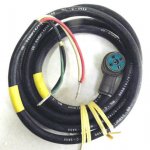What you are hearing is "alternator whine", it is AC voltage being passed by the alternator due to a bad diode in the alternator. The alternator is not putting out a steady state DC, there is an AC ripple voltage being imposed on it. If you look at the wave form on an oscilloscope you would see exactly what it is.
The fix is repairing the alternator diode pack or, placing a choke in series of each leg of the power feed and two capacitors shunted across those leads. Its called a pi filter. Look it up.
The capacitors will redirect the AC ripple voltage to ground. The series chokes impede the AC flow and stop it from entering the electronics of whate ever is connected to the battery terminals.
Ferrite beads are for common mode RF and do little to remedy direct AC ripple voltages present on DC line feeds. That AC must be directly shunted to ground via a capacitor.
The series choke must be capable of handling the total current draw of the device you are using. That means it must be wound with sufficient size wire to accommodate the amperage being drawn by the device it is filtering for.
If you are handy, you can wind your own chokes on ferrite beads, then solder two capacitors across those chokes and build yourself a pi filter.
Send me a PM with your address and I'll send you the components for mailing fees.

This is a pi filter. It can be modified and improved by adding another L(series inductor/choke) in the ground leg.




